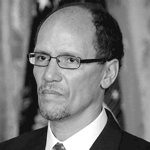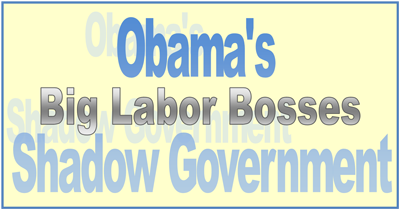DOL Giving UAW, IG Metall, VW "De Facto Immunity"
From the National Right to Work Legal Defense Foundation: Worker Advocate Urges Labor Secretary: Apply Federal Disclosure Law to German Union…

From the National Right to Work Legal Defense Foundation: Worker Advocate Urges Labor Secretary: Apply Federal Disclosure Law to German Union…

As the National Right to Work Committee warned in emails to its members and in this video that Solicitor of Labor M. Patricia Smith would approve deputizing union organizers with Obama…

A communist news and propaganda site, World Socialist Web Site, exposed another Big Labor payback by Barack Obama and his new Labor Secretary Thomas…

From BuzzFeed: Secretary of Labor Hilda Solis resigned Wednesday afternoon, three sources told BuzzFeed. Solis was one of the least-visible members of President Barack Obama’s cabinet, rarely appearing on national television or with…

From BuzzFeed: Secretary of Labor Hilda Solis resigned Wednesday afternoon, three sources told BuzzFeed. Solis was one of the least-visible members of President Barack Obama’s cabinet, rarely appearing on national television or with…

An obvious residual effect of President Obama’s re-election was the renewal of his government giveaways to the union bosses.

United States attorney Loretta E. Lynch: Hector Lopez turned the union members’ benefits fund into “a personal piggy bank, lining his pockets with the fruits of their labors.” The former boss of an International Union of Painters and Allied Trades (IUPAT) union local in Long Island City, Queens, was arrested on Tuesday and accused of abusing his position through a host of illegal schemes, including taking hundreds of thousands of dollars in kickbacks from a company he contracted to run the union’s health benefits plan, the New York Times reports: Hector Lopez, the former president of Local 8a-28a, which represents metal polishers, sign painters and other tradespeople, set up an elaborate money-laundering operation involving several companies that funneled secret payments to him, according to a 29-page indictment that was unsealed in Federal District Court in Brooklyn. In the most serious kickback scheme, Mr. Lopez, 54, is accused of accepting $740,000 over a seven-year period in exchange for guaranteeing one company the contract to administer the union’s benefits fund. The indictment did not name Mr. Lopez’s alleged accomplices or the names of the companies involved.

Compulsory Unionism Negatively Correlated With Compensation Growth (source: National Right To Work Committee April 2012 Newsletter) By prohibiting compulsory union dues, state Right to Work laws spur the growth of private-sector employee compensation in the form of wages, salaries, benefits and bonuses, as well as employment growth. Last month, the U.S. Commerce Department's Bureau of Economic Analysis (BEA) issued its estimates for 2011 state personal income. The BEA also issued estimates for an array of specific kinds of income, including employee compensation, at the state level. The 2011 BEA income data in general, and the compensation data especially, show once again that there is a strong negative correlation between compulsory unionism and economic growth. Overall, private-sector employee compensation (including wages, salaries, benefits and bonuses) grew by 6.4% nationwide over the past decade, after adjusting for inflation. Historically speaking, this was slow growth. However, states that protect employees from being fired for refusal to pay dues or fees to an unwanted union typically fared far better than the rest. (From 2001 to 2011, 22 states had Right to Work laws prohibiting forced union dues on the books. Last month Indiana became the 23rd Right to Work state.) A review of how compensation and jobs grew (or failed to grow) in each state suggests the U.S. Congress could dramatically improve America's economic prospects for the next decade by repealing forced union dues and fees nationwide. Current federal law authorizes and promotes the payment of compulsory union dues and fees as condition of getting or keeping a job. Right to Work States' 2001-2011 Compensation Increase Nearly Double the National Average

Compulsory Unionism Negatively Correlated With Compensation Growth (source: National Right To Work Committee April 2012 Newsletter) By prohibiting compulsory union dues, state Right to Work laws spur the growth of private-sector employee compensation in the form of wages, salaries, benefits and bonuses, as well as employment growth. Last month, the U.S. Commerce Department's Bureau of Economic Analysis (BEA) issued its estimates for 2011 state personal income. The BEA also issued estimates for an array of specific kinds of income, including employee compensation, at the state level. The 2011 BEA income data in general, and the compensation data especially, show once again that there is a strong negative correlation between compulsory unionism and economic growth. Overall, private-sector employee compensation (including wages, salaries, benefits and bonuses) grew by 6.4% nationwide over the past decade, after adjusting for inflation. Historically speaking, this was slow growth. However, states that protect employees from being fired for refusal to pay dues or fees to an unwanted union typically fared far better than the rest. (From 2001 to 2011, 22 states had Right to Work laws prohibiting forced union dues on the books. Last month Indiana became the 23rd Right to Work state.) A review of how compensation and jobs grew (or failed to grow) in each state suggests the U.S. Congress could dramatically improve America's economic prospects for the next decade by repealing forced union dues and fees nationwide. Current federal law authorizes and promotes the payment of compulsory union dues and fees as condition of getting or keeping a job. Right to Work States' 2001-2011 Compensation Increase Nearly Double the National Average